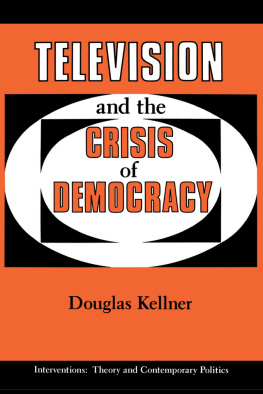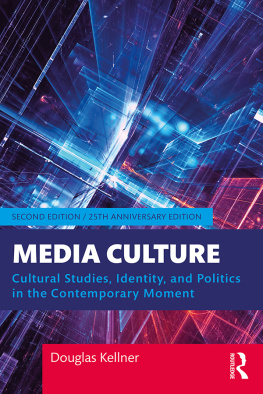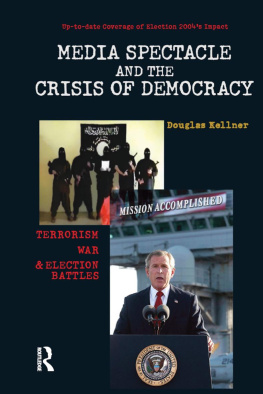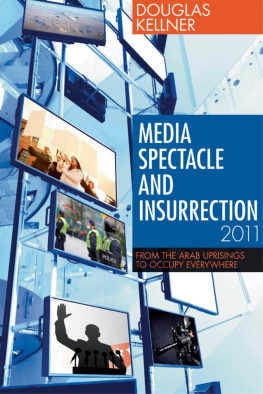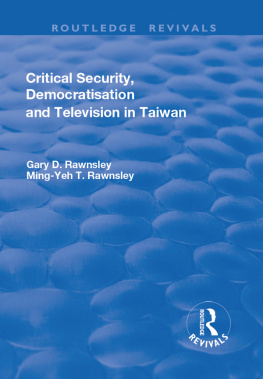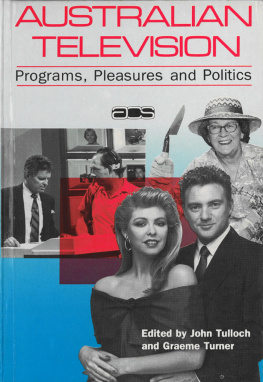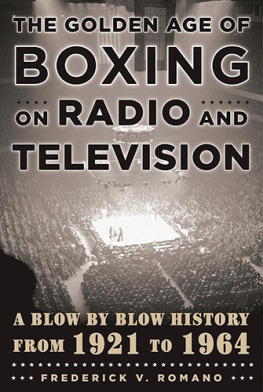Interventions: Theory and Contemporary Politics
First published 1990 by Westview Press
Published 2018 by Routledge
711 Third Avenue, New York, NY 10017, USA
2 Park Square, Milton Park, Abingdon, Oxon OX14 4RN
Routledgs is an imprint of the Taylor & Francis Group, an informa business
Copyright 1990 Taylor & Francis
All rights reserved. No part of this book may be reprinted or reproduced or utilised in any form or by any electronic, mechanical, or other means, now known or hereafter invented, including photocopying and recording, or in any information storage or retrieval system, without permission in writing from the publishers.
Notice:
Product or corporate names may be trademarks or registered trademarks, and are used only for identification and explanation without intent to infringe.
Library of Congress Cataloging-in-Publication Data
Kellner, Douglas, 1943
Television and the crisis of democracy/Douglas Kellner.
p. cm.(Interventionstheory and contemporary politics)
Includes bibliographical references and index.
ISBN 0-8133-0548-9.ISBN 0-8133-0549-7 (pbk.)
1. Television and politicsUnited States. I. Title.
II. Series.
HE8700.76.U6K45 1990
324.7'3'0973dc20 90-39829
CIP
ISBN 13: 978-0-8133-0549-3 (pbk)
Interventions Theory and Contemporary Politics
Stephen Eric Bronner , Series Editor
Television and the Crisis of Democracy, Douglas Kellner
FORTHCOMING
Corporate Society: Class, Property, and
Contemporary Capitalism, John McDermott
Crises and Transitions: A Critique of the New
International Economic Order, Richard D. Wolff,
Stephen Resnick, and David F. Ruccio
Reinventing the Welfare State: Political Change and
Social Policy in the United States, Charles Noble
Every man thinks he has a concern in all public matters; that he has a right to form and a right to deliver an opinion on them. They sift, examine, and discuss them. They are curious, eager, attentive, and jealous; and by making such matters the daily subjects of their thoughts and discoveries, vast numbers contract a very tolerable knowledge of them, and some a very considerable one.... In free countries, there is often found more real public wisdom and sagacity in shops and manufacturies than in the cabinets of princes in countries where none dare to have an opinion until he comes into them. Your whole importance, therefore depends upon a constant, discreet use of your own reason.
Edmund Burke
A popular government without popular information or the means of acquiring it is but a prologue to a Farce or a Tragedy; or perhaps both. Knowledge will forever govern ignorance; and a people who mean to be their own governors must arm themselves with the power which knowledge gives.
James Madison
The press, designed for freedom's best defence,
And learning, morals, wisdom to dispense,
Perverted, poisoned, lost to honor's rules,
Is made the sport of knaves, to govern fools.
Philadelphia Public Ledger, 1839
There is no need of a law to check the license of the press. It is law enough, and more than enough to itself. Virtually, the community have come together and agreed what things should be uttered, have agreed on a platform and to excommunicate him who departs from it, and not one in a thousand dares utter anything else.
Henry David Thoreau
To the One in a Thousand Who Spoke Out
In 1973 David Rockefeller and other corporate leaders founded the Trilateral Commission, which sought to discover ways to stabilize the capitalist democracies of the United States, Western Europe, and Japan. Within two years, the commission had more than 300 members, drawn from the elites of the corporate, government, labor, and media sectors of these countries. In 1975 it released a report entitled The Crisis of Democracy (Crozier, Huntington, and Watanuki 1975). According to the authors of this work, too much democracy in the Western capitalist societies was making them increasingly difficult to govern. The media were allegedly promoting an "adversary culture" that was undermining leadership, challenging authority, and delegitimizing established institutions (ibid., 6-7).
The report concluded that the media, especially television, were promoting excessive democracy (ibid., 33ff., 98ff.). Huntington argued that the media constituted the "most notable new source of national power in 1970" and were spreading a "democratic distemper" that threatened the stability of existing capitalist societies. An imbalance had occurred, Huntington argued, between democratic demands and social order. Likewise, he deemed the media to be too critical of state policy, thus requiring the restoration of "a balance between government and media" (ibid., 181). Accordingly, the Trilateral Commission Report argued that the media, Congress, the educational system, and other major institutions must curb the "democratic distemper" to promote order and stability. Less democracy was therefore necessary to "save" democracy.
In this book, I argue that the goals of the Trilateral Commission were realized during the 1980s at the expense of democracy itself. My position is the reverse of that of the Trilateral Commission. Although I agree that there is indeed a crisis of democracy in the United States today, I claim that it is precisely because there is not enough democracy and that the media, especially television, have subverted the very foundations of democratic government. My argument is that television and the media not only have failed in recent years to carry out the democratic functions of providing the information necessary to produce an informed citizenry but also have promoted the growth of excessive corporate and state power. In this book I shall accordingly describe how the commercial television networks were taken over by corporate conglomerates and have become instruments of corporate power that have undermined the foundations of democracy in the United States. From this perspective, the conglomeratization of television can be seen as part of the restructuring of the capitalist system that has occurred during the transition from an economic order based on industry and manufacturing to a new high-tech media/information society. In this new socioeconomic configuration, television and the entertainment/information industries have in the last decade achieved a significant increase in economic, political, social, and cultural power. Corporate control of television, I shall argue, has greatly increased the power of the dominant conservative and corporate forces while undermining democracy. Development of this theme involves analysis of the relations among business, the state, and the media, combined with analysis of how the new configurations of media power constitute a clear and present threat to democracy in the United States.
My aim is twofold: to produce a critical theory of television that provides comprehensive perspectives on the system of commercial television in the United States and to develop proposals for reconstructing the medium so as to make it more democratic. For more than fifteen years, I have been working on developing a theory of the nature, social functions, and effects of television. Systematic inquiry began in 1975 in a study group in Austin, Texas, and my theoretical position is indebted to members of this group: Lynn Carr, Bill Gibson, John Gibson, Jim Greene, Stuart Hersh, Frank Morrow, Harry O'Hara, and Jack Schierenbeck. An earlier version of on public access television appeared in different forms in Making Waves (Vol. 16, 1985), Donald Lazere's American Media and Mass Culture (1987), and Vincent Mosco and Janet Wasko's Democratic Communications in the Information Age (1990). This section is especially indebted to my work on a public access program with Frank Morrow, "Alternative Views," which we have undertaken from 1978 to the present.

